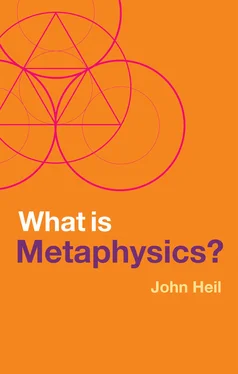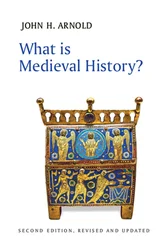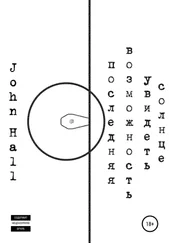1 Cover
2 Endorsement John Heil is Professor of Philosophy at Washington University in St Louis, Professor of Philosophy at Durham University, and an Honorary Research Associate at Monash University. Professor Heil is a Fellow of the Australian Academy of Humanities and is listed among the 50 Most Influential Living Philosophers.
3 Series Page Polity’s What is Philosophy? series John Heil, What is Metaphysics? Stephen Hetherington, What is Epistemology? Tom McClelland, What is Philosophy of Mind? Dean Rickles, What is Philosophy of Science? James P. Sterba, What is Ethics? Charles Taliaferro, What is Philosophy of Religion?
4 Title Page What is Metaphysics? John Heil polity
5 Copyright Copyright © John Heil 2021 The right of John Heil to be identified as Author of this Work has been asserted in accordance with the UK Copyright, Designs and Patents Act 1988. First published in 2021 by Polity Press Polity Press 65 Bridge Street Cambridge CB2 1UR, UK Polity Press 101 Station Landing Suite 300 Medford, MA 02155, USA All rights reserved. Except for the quotation of short passages for the purpose of criticism and review, no part of this publication may be reproduced, stored in a retrieval system or transmitted, in any form or by any means, electronic, mechanical, photocopying, recording or otherwise, without the prior permission of the publisher. ISBN-13: 978-1-5095-4650-3 A catalogue record for this book is available from the British Library. Library of Congress Cataloging-in-Publication Data Names: Heil, John, author. Title: What is metaphysics? / John Heil. Description: Cambridge ; Medford, MA : Polity, 2021. | Series: What is philosophy? | Includes bibliographical references and index. | Summary: “Metaphysics can be understood as the branch of philosophy that examines the fundamental nature of reality. In this textbook for students new to the topic, John Heil covers the key concepts in an original, jargon-free way” -- Provided by publisher. Identifiers: LCCN 2021000205 (print) | LCCN 2021000206 (ebook) | ISBN 9781509546480 (hardback) | ISBN 9781509546497 (paperback) | ISBN 9781509546503 (epub) Subjects: LCSH: Metaphysics. Classification: LCC BD131 .H45 2021 (print) | LCC BD131 (ebook) | DDC 110--dc23 LC record available at https://lccn.loc.gov/2021000205 LC ebook record available at https://lccn.loc.gov/2021000206 The publisher has used its best endeavors to ensure that the URLs for external websites referred to in this book are correct and active at the time of going to press. However, the publisher has no responsibility for the websites and can make no guarantee that a site will remain live or that the content is or will remain appropriate. Every effort has been made to trace all copyright holders, but if any have been overlooked the publisher will be pleased to include any necessary credits in any subsequent reprint or edition. For further information on Polity, visit our website: politybooks.com
6 Dedication Dedication In memory of David Armstrong, Charlie Martin, and Jack Smart
7 Preface Preface Metaphysics is, by my lights, a difficult, but indispensable, subject. Each of us harbors unexamined metaphysical preconceptions that might, or might not, survive serious scrutiny. This book aims to tease out those preconceptions in a manner that challenges you the reader to confront them. Many of your preconceptions are widely shared, and many, no doubt, are warranted even though you might not be in a position to vouch for them were you called upon to do so. Socrates observed that an unexamined life was not worth living. He did not mean that a life worth living requires having all the answers. He meant that we should recognize what we know and what we only think we know: we should understand our limitations and what these might portend. This is the spirit in which I offer this book. The goal is not to parade a string of metaphysical doctrines past you and declaim their pros and cons. The goal, rather, is to encourage you to reflect on matters that, for most of us, most of the time, remain beneath reflection. This is not a frivolous undertaking. Preconceptions spawn attitudes that color thoughts and actions, sometimes in surprising ways. Distinctively metaphysical attitudes are intertwined with attitudes we evince as we go about our business – in everyday life, in the arts, and in the sciences. The trick is to recognize them for what they are and thereby be in a position to take into account their influence – for good or ill – on the attitudes that govern our serious thoughts about the cosmos and our place in it. This book approaches metaphysics, not as an academic subject to be mastered then forgotten, but as a hands-on exercise, the lasting value of which lies in the doing. For this reason, I have not tried to hide my own views, an impossibility in any event. That might be worrisome were it not the case that the views are the vehicles, not the destinations. If I succeed in persuading you that metaphysics, far from being a purely academic pastime, is unavoidable, I will be content. If I leave you better equipped to recognize hidden metaphysical themes for what they are, I will be delighted. Although the book presupposes no prior acquaintance with metaphysics, I have tried to steer the conversation in ways that might engage even hardened academic philosophers. If you are among their ranks, you are hereby forewarned not to expect exhaustive treatments of individual metaphysical doctrines. There is a time and a place for everything, and this is neither the time, nor the place, for exhaustive treatments of anything. John Heil Melbourne July 2020
8 Acknowledgments Acknowledgments What is Metaphysics? took shape in Melbourne during my tenure as a Fulbright Fellow in the first half of 2020. I am much indebted to the Australian–American Fulbright Commission and to Monash University, my host institution, for their support. The Fellowship, which was meant to run from mid-February through June, was cut short by the onset of the Covid-19 pandemic, but I remained in Australia with my wife, Harrison, and continued working from our adopted home in Caulfield South thanks to the graciousness of Marie-Thérèse Jensen. My stay at Monash would not have been possible without the support of Christina Twomey, Head of the School of Philosophical, Historical, and International Studies; Jakob Hohwy, Head, Department of Philosophy; and Jessica Weijers, School Manager, who deserves a gold parking pass. I would not be the philosopher I am, and this book would not have been the book it is, had I not enjoyed the company of ten philosophers who are no longer around to read these words: David Armstrong, Donald Davidson, Fred Dretske, J. J. Gibson (whom I count as a philosopher), Jonathan Lowe, Charlie Martin, Norman Malcolm, Hugh Mellor, Mark Overvold, and Jack Smart. Keith Campbell and John Bigelow, both important figures in Australian philosophy, have continued to exert a powerful gravitational pull on my thoughts, although not always in the same direction. I have also been influenced at close range by Jonathan Bennett, Alex Carruth, Randolph Clarke, Heather Dyke, Anthony Fisher, Frank Jackson, Jaegwon Kim, Anna Marmodoro, Yitzhak Melamed, Elizabeth Miller, Gonzalo Rodriguez-Pereyra, Peter Simons, Roy Sorensen, Galen Strawson, and Peter van Inwagen. I am most grateful to four anonymous readers who provided insightful advice and managed to convince me to temper my worst instincts, and to Ian Tuttle for finding and correcting numerous gaffes and infelicities. Harrison Hagan Heil suffered through successive versions of the book, offered invaluable counsel, and, more than anyone else, helped shape its character. Pascal Porcheron, my editor at Polity Press, encouraged me to persevere in the project that resulted in this book. An old adage has it that the best way to learn something is to teach it. To the extent that this is true, it is true because you do not fully understand something until you can explain it to yourself, a prerequisite for teaching it to others. Writing this book afforded me the rare opportunity to do both, and for that I am especially grateful to Pascal and to Polity Press.
Читать дальше












